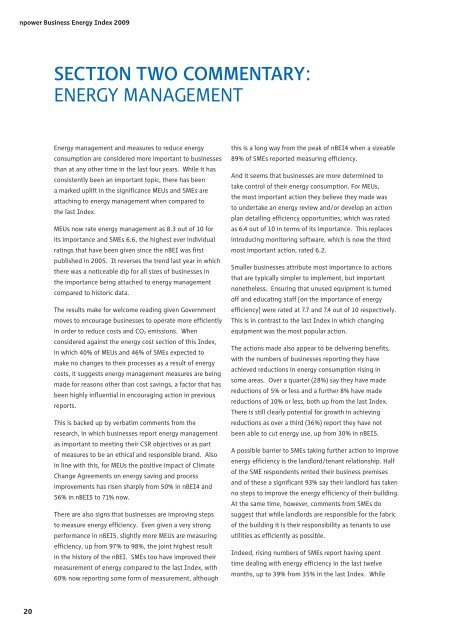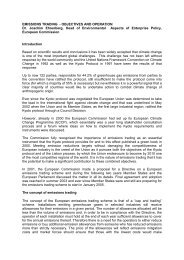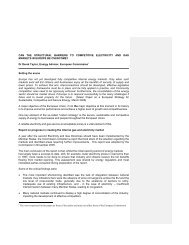Business Energy Users Survey - Winter 2008/09 - Moffatt Associates
Business Energy Users Survey - Winter 2008/09 - Moffatt Associates
Business Energy Users Survey - Winter 2008/09 - Moffatt Associates
You also want an ePaper? Increase the reach of your titles
YUMPU automatically turns print PDFs into web optimized ePapers that Google loves.
npower <strong>Business</strong> <strong>Energy</strong> Index 20<strong>09</strong>npower <strong>Business</strong> <strong>Energy</strong> Index 20<strong>09</strong>Section TWO Commentary:<strong>Energy</strong> management<strong>Energy</strong> management and measures to reduce energyconsumption are considered more important to businessesthan at any other time in the last four years. While it hasconsistently been an important topic, there has beena marked uplift in the significance MEUs and SMEs areattaching to energy management when compared tothe last Index.MEUs now rate energy management as 8.3 out of 10 forits importance and SMEs 6.6, the highest ever individualratings that have been given since the nBEI was firstpublished in 2005. It reverses the trend last year in whichthere was a noticeable dip for all sizes of businesses inthe importance being attached to energy managementcompared to historic data.The results make for welcome reading given Governmentmoves to encourage businesses to operate more efficientlyin order to reduce costs and CO 2 emissions. Whenconsidered against the energy cost section of this Index,in which 40% of MEUs and 46% of SMEs expected tomake no changes to their processes as a result of energycosts, it suggests energy management measures are beingmade for reasons other than cost savings, a factor that hasbeen highly influential in encouraging action in previousreports.This is backed up by verbatim comments from theresearch, in which businesses report energy managementas important to meeting their CSR objectives or as partof measures to be an ethical and responsible brand. Alsoin line with this, for MEUs the positive impact of ClimateChange Agreements on energy saving and processimprovements has risen sharply from 50% in nBEI4 and56% in nBEI5 to 71% now.There are also signs that businesses are improving stepsto measure energy efficiency. Even given a very strongperformance in nBEI5, slightly more MEUs are measuringefficiency, up from 97% to 98%, the joint highest resultin the history of the nBEI. SMEs too have improved theirmeasurement of energy compared to the last Index, with60% now reporting some form of measurement, althoughthis is a long way from the peak of nBEI4 when a sizeable89% of SMEs reported measuring efficiency.And it seems that businesses are more determined totake control of their energy consumption. For MEUs,the most important action they believe they made wasto undertake an energy review and/or develop an actionplan detailing efficiency opportunities, which was ratedas 6.4 out of 10 in terms of its importance. This replacesintroducing monitoring software, which is now the thirdmost important action, rated 6.2.Smaller businesses attribute most importance to actionsthat are typically simpler to implement, but importantnonetheless. Ensuring that unused equipment is turnedoff and educating staff [on the importance of energyefficiency] were rated at 7.7 and 7.4 out of 10 respectively.This is in contrast to the last Index in which changingequipment was the most popular action.The actions made also appear to be delivering benefits,with the numbers of businesses reporting they haveachieved reductions in energy consumption rising insome areas. Over a quarter (28%) say they have madereductions of 5% or less and a further 8% have madereductions of 10% or less, both up from the last Index.There is still clearly potential for growth in achievingreductions as over a third (36%) report they have notbeen able to cut energy use, up from 30% in nBEI5.A possible barrier to SMEs taking further action to improveenergy efficiency is the landlord/tenant relationship. Halfof the SME respondents rented their business premisesand of these a significant 93% say their landlord has takenno steps to improve the energy efficiency of their building.At the same time, however, comments from SMEs dosuggest that while landlords are responsible for the fabricof the building it is their responsibility as tenants to useutilities as efficiently as possible.Indeed, rising numbers of SMEs report having spenttime dealing with energy efficiency in the last twelvemonths, up to 39% from 35% in the last Index. Whiletime investment has risen, the effects of the economicdownturn are being felt in the financial resources that arededicated to energy management. The number of SMEswho say they have cash to dedicate to efficiency measureshas fallen to 38% now from 44% in nBEI5. In line withthis we might expect increasing numbers of SMEs to beneeding external advice on energy management, but thistoo has dropped slightly from 41% wanting adviceto 35% this time. Similarly, fewer numbers of smallbusinesses want advice on reducing carbon emissions,with 35% confirming this in comparison to 43% in <strong>2008</strong>.The slight drop could be a result of a growing knowledgeat this level.A similar response is seen at MEU level, with the numberof businesses saying they need advice on managingenergy efficiency and carbon emissions decreasing.This is despite MEUs attaching increasing importanceto both energy and emission management, both upslightly compared to last year’s report. The drop in thoseneeding advice could be explained by the increasingnumbers of MEUs employing full time energy managementstaff, which has seen a sizeable 19% increase sincethe last Index. There has also been a marked increasein large businesses employing building managementsystems – typically a key component in reducing energyconsumption. Now, a sizeable 87% of MEUs have suchsystems, compared to 73% in nBEI5 and 72% in nBEI4.In terms of achieving future efficiencies, both MEUs andSMEs appear keen to engage their workforce to enactenergy saving measures. For MEUs, encouraging staffto take action was seen as the most important factor inhelping to reduce energy costs, with a rating of 5.59out of 10. For SMEs, staff action was secondonly to making sure equipment was turned off.As an overview, there appears to be an increasingwillingness from companies of all sizes to improve energyefficiency. While some still report a lack of resources toimprove efficiency measures, the polarisation betweenMEUs and SMEs that has been appearing in previousreports seems to be lessening with an increasing numberof SMEs now reporting they are spending time on energyefficiency.2021




